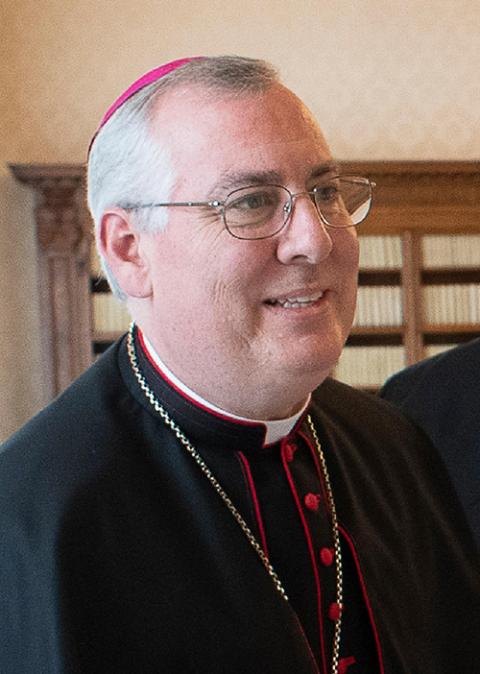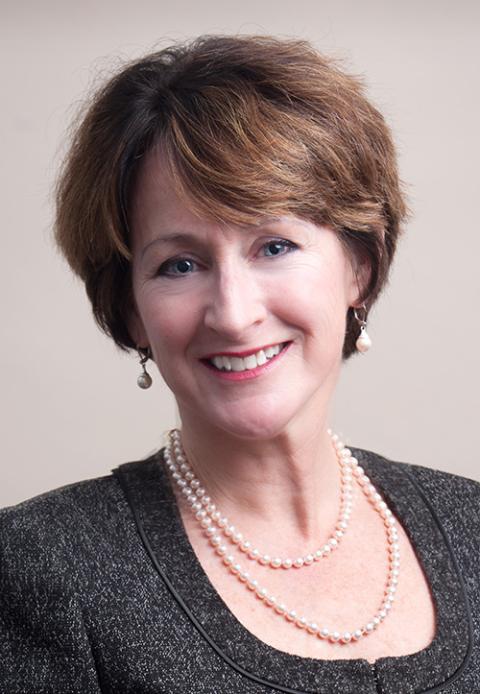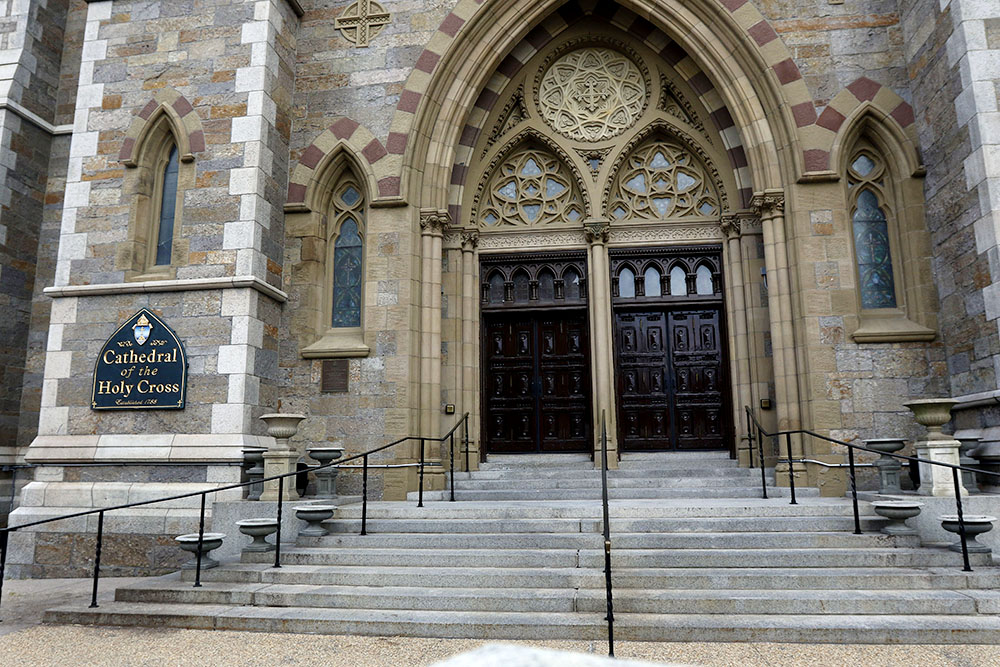
The Cathedral of the Holy Cross in the Boston Archdiocese (AP/Bill Sikes)
Michael Sennett said two things felt deeply true when he was a teenager: He was transgender and he loved his Catholic faith.
After coming out at age 16, he began attending Mass frequently on his own. Following graduation from a Catholic college, he landed a job at a Jesuit parish a few miles outside Boston. For the past few years, he has served as communications director and coordinator of social justice programming at the parish.
Last June, the 27-year-old received an unexpected email. Boston Cardinal Sean O'Malley had formed a committee tasked with crafting gender-identity guidelines for Catholic schools, focused on students in kindergarten through eighth grade. A committee member, Maureen DiMilla, was reaching out to see if Sennett might be willing to share with the committee his experiences as a transgender Catholic.
Sennett responded quickly, saying how much he appreciated the effort to hear different perspectives and that he was eager to help in any way he could.
Such an exchange is likely rare. As a growing number of U.S. dioceses craft policies and guidelines on gender identity and, to a lesser extent, sexual orientation, few LGBTQ individuals appear to be part of the drafting process.
"One of the heartbreaking things about the policies is that they are not reflecting the voices of LGBTQ persons," said David Palmieri, a Massachusetts-based theology teacher who has been studying the diocesan gender documents.
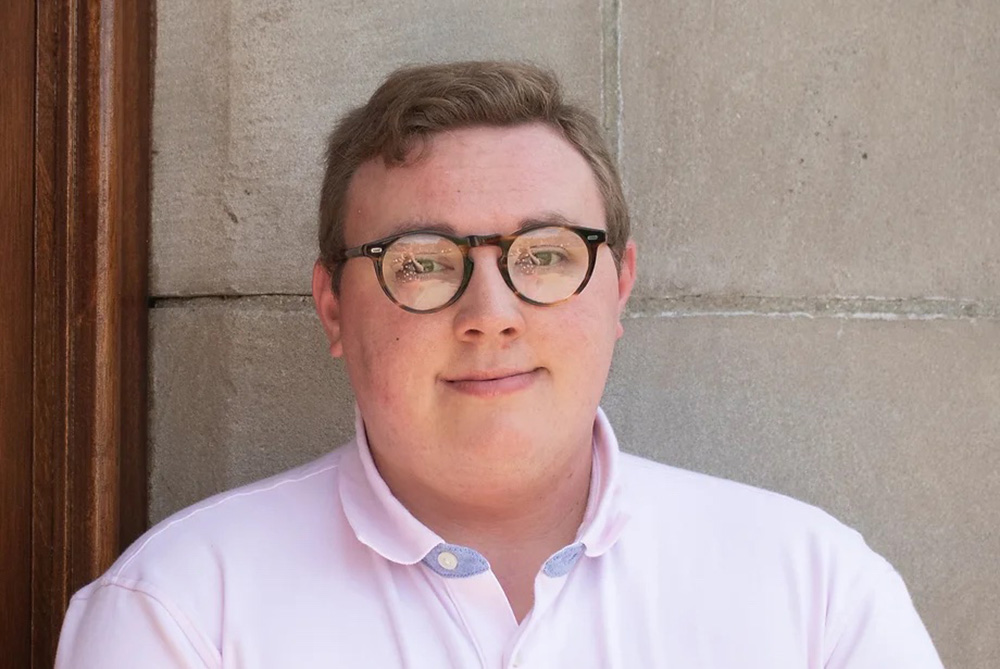
Michael Sennett, a transgender Catholic in the Boston Archdiocese (Courtesy of Michael Sennett)
The emailed invitation to Sennett, however, proved premature; it's not yet clear if the Boston Archdiocese will in fact have him meet with the committee drafting the new document.
Still, DiMilla's and Sennett's willingness to speak openly with NCR offers another rarity: an inside, if partial, look at a process that typically lacks transparency.
Both Catholics repeatedly expressed empathy for O'Malley and Boston Auxiliary Bishop Mark O'Connell, who is chairing the drafting committee, but said their experiences bolster critiques not only about the dearth of LGBTQ voices in the process but also about some of the questionable medical claims some documents communicate.
DiMilla, a licensed mental health counselor, is former director of the Boston Archdiocese's child advocacy office and spent nearly two decades working for the state of Massachusetts in child protection.
"My No. 1 priority in this process is the children," DiMilla told NCR.
Along with other committee members, she felt it vital to have both a psychiatrist who helps transgender youths and a transgender individual speak with the group. Hoping for a green light from O'Connell for both requests, DiMilla had reached out to Sennett.
'I don't think Cardinal Sean or Bishop O'Connell have this crusade against trans people. They have hard jobs and I think are trying to do the right thing. But I wish they'd listen and let us be part of the conversation.'
—Michael Sennett
But while the bishop agreed to a psychiatrist from Boston Children's Hospital, he did not agree to a transgender Catholic, according to DiMilla.
"It was not entirely unexpected but still pretty depressing," said Sennett about the decision.
O'Connell eventually said he was open to a trans person reviewing the document, DiMilla explained, and around Jan. 20 the archdiocese asked her for Sennett's contact information.
Sennett said he has not heard from the archdiocese so far. DiMilla believes the draft likely is in the final stages.
"Communication with the archdiocese would be a step in the right direction," said Sennett, but "dialogue with the transgender community cannot simply be an afterthought."
"I don't think Cardinal Sean or Bishop O'Connell have this crusade against trans people," he said. "They have hard jobs and I think are trying to do the right thing. But I wish they'd listen and let us be part of the conversation. The U.S. bishops have been making or approving these policies, and they try to say we love and respect everyone and we need to dialogue, but that's just not happening. We are not present at the table."
NCR contacted the archdiocese to ask O'Connell questions about the document, including if he plans to have a transgender person review the guidelines or policy.
"We are going through a process right now that has not been completed," Terrence Donilon, archdiocesan spokesperson, told NCR in an email response. "It is a very thoughtful process and very collaborative. It is simply too early to discuss just yet."
Last summer, NCR asked all dioceses with known gender policies or instructions if any LGBTQ individuals were included during the drafting process. Only about one-third responded; a handful of those said LGBTQ individuals were consulted.
Sennett said he had planned to provide his perspective to committee members, not direct them to take specific action.
"If a child thinks they might be transgender and if a community doesn't feel safe, it can create a sense of isolation and self-hatred within the individual," said Sennett.
He said he wanted in part to emphasize to members that "when faith communities are supportive, it's huge. Having that sense of community is what helps people thrive."
DiMilla said the 11 members of the Boston archdiocese committee drafting the document reflect a variety of views.
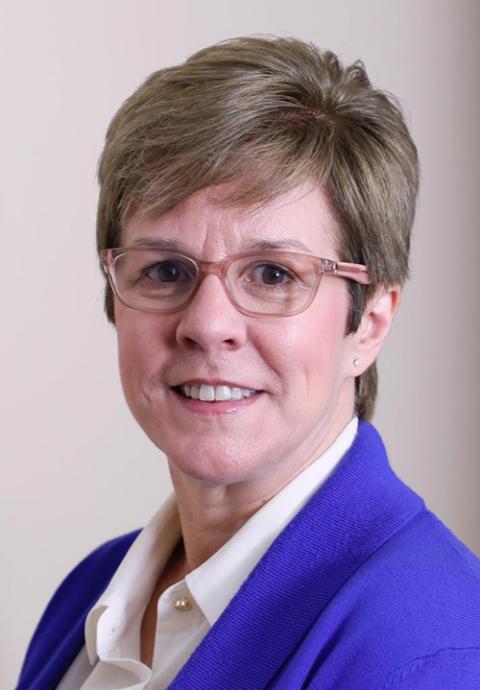
Maureen DiMilla (Courtesy of Maureen DiMilla)
She also said that as part of the drafting process the members reviewed a draft of a gender identity document from another diocese and read, among other items, a 2019 Vatican document, "Male and Female He Created Them"; Pope Francis' 2016 apostolic exhortation on family life, Amoris Laetitia; the American Psychiatric Association's diagnostic manual; and excerpts from several books.
Members also heard from Mary Hasson, co-founder and director of the Person and Identity Project, affiliated with the Ethics and Public Policy Center, a conservative think tank. Staff of the project have served as consultants for a number of dioceses drafting guidelines and policies.
The organization's website contains a video about trans youths featuring a plastic surgeon who has admitted he is not an expert on gender dysphoria, endocrinology, pediatric health care, medical ethics or mental health. The website also contains resources from non-mainstream medical organizations, such as the American College of Pediatricians (on that organization's website under suggested reading is the book A Parent's Guide to Preventing Homosexuality).
DiMilla said Hasson spoke to the Boston committee about how doctors were "mutilating children's genitalia."
"It was provocative and salacious," said DiMilla.
(At least four policies, including the document issued by the Diocese of Springfield, Illinois, mention "mutilation" when outlining the kinds of interventions children receive for gender dysphoria.)
Hasson, a fellow at the Ethics and Public Policy Center, told NCR she was surprised a Boston committee member was speaking about her talk publicly, as it was her understanding the presentations were for internal use only, to assist the committee in their discussions.
"It's not my place to discuss the substance of any meetings with the archdiocese, except to say [DiMilla's observation] is not accurate and misrepresents my work," Hasson said in an email, adding that in general her presentations focus on specific aspects of gender-affirming care and cite from published studies and gender clinicians.
She also shared a number of studies in her email, with one indicating that genital surgeries have been reported on male teens as young as 15.
Medical guidelines, however, typically do not recommend gender-affirming surgeries for youths before they are 18.
Boston Children's Hospital is home to the first pediatrics and adolescent transgender program in the United States. Its website states that no genital surgeries are performed on transgender patients until they are 18 or older.
Not all transgender individuals choose to medically transition, and Sennett noted that trans people have diverse opinions about medical interventions.
"The most important thing is not policies but listening to these families, to these children," he said.
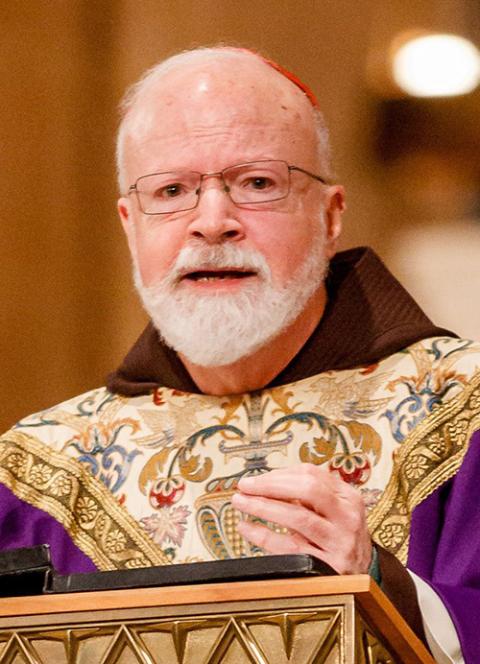
Boston Cardinal Sean O'Malley (CNS/The Pilot/Gregory L. Tracy)
As to what the Boston document will contain, DiMilla said she doesn't think it will be as stringent as some, including the guidelines recently issued by the Archdiocese of Portland, Oregon. She said she senses no objections from committee members about gender-neutral uniform options and gender-neutral bathrooms, when possible.
Though the committee is drafting the document, its approval rests with O'Malley, who has walked a fine line around LGBTQ issues.
In 2010, after a Catholic school in the archdiocese revoked admission to the 8-year-old child of a lesbian couple, O'Malley supported the pastor's decision about rescinding admission while also trying to help the couple find another Catholic school in which to enroll their child.
"Catholic schools exist for the good of the children, and our admission standards must reflect that," O'Malley wrote in a blog post at the time. "We have never had categories of people who were excluded."
In the same post, he also wrote: "But we recognize that, regardless of the circumstances involved, we maintain our responsibility to teach the truths of our faith."
DiMilla anticipates the final Boston document will direct schools to use only pronouns and names that correspond to students' sex as assigned at birth.
"While I understand the objection to the use of preferred name and pronouns, I do not see an issue with using them," said DiMilla.
'It's not always about saying you are right and affirming everything, but saying you are welcome here on your journey, even if you don't know where that will end up.'
—Maureen DiMilla
Drawing on her experience as a counselor, DiMilla said she believes "transgender people absolutely exist" but that there are some children who may "try on" the idea of a different gender. Figuring out who they are "is what growing up and finding autonomy is all about," she said.
Strict policies simply turn a family away from a school and possibly the Catholic Church, she said.
"It's not always about saying you are right and affirming everything, but saying you are welcome here on your journey, even if you don't know where that will end up," said DiMilla.
A new study published in the journal Pediatrics suggests most children who start identifying as transgender at a young age tend to retain that identity five years later. The authors note there are limitations with the study, including that it focused on white children from high-income families.
Sennett said he feels it would be "highly concerning" if the Boston document directs schools to not use the chosen names or pronouns of students.
He pointed to data suggesting a correlation between an affirming environment for transgender youths and improved mental health outcomes.
Decreasing depression and suicide in an already vulnerable population should be a priority, he said. "It's a pro-life issue."
Advertisement
"Some people think all this discussion of suicide is hyperbole," added DiMilla. "It really isn't. I've seen enough to know it's not."
(Violence against transgender and gay Americans also has increased the past two years. Experts say the trend is driven in large part by increasingly vitriolic political messaging.)
DiMilla said she believes O'Connell is trying to "walk down the middle on this, trying to wrap all these guidelines into something palatable for both extremes."
"I'm not sure it's possible," she said. "But God love him for trying."
Said Sennett: "Ultimately, I think guidelines and policies have the ability to be positive."
He suggested diocesan documents could potentially "direct schools, parishes and institutions on the importance of cura personalis" (a Latin phrase used by the Jesuits meaning "care of the whole person").
"So many of the policies emphasize the dignity of every person, and the love God has for each of us, yet the language throughout does not reflect this reality," said Sennett, reiterating he does not believe O'Connell or O'Malley are ill-intentioned.
"I really do think they are doing the best they can with the knowledge they have — and that is why it's so important to listen to the voices of transgender people and allies. In Isaiah, we read, 'Enlarge the space for your tent.'"
"There is room," Sennett said, "for all of us."

